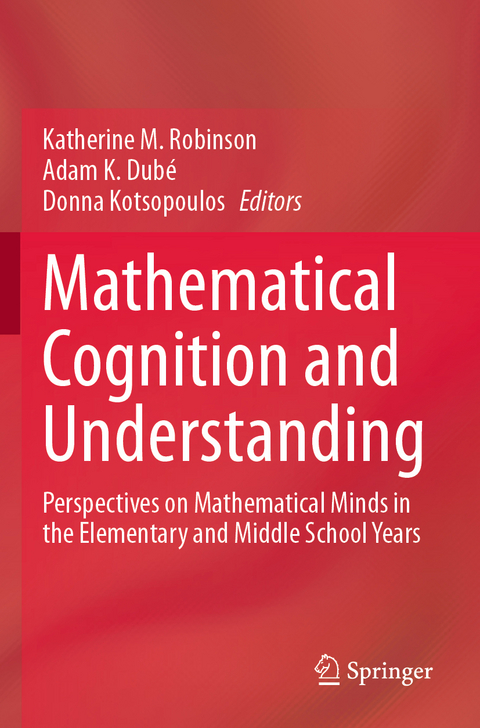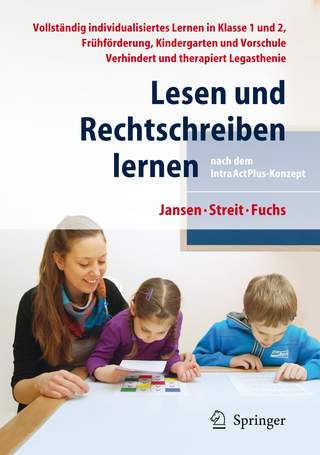
Mathematical Cognition and Understanding
Springer International Publishing (Verlag)
978-3-031-29197-5 (ISBN)
This book focuses on elementary and middle school children's understanding of mathematics as well as the cognitive aspects involved in the development of mathematical knowledge, skills, and understanding. Children's success in and understanding of mathematics stem from factors beyond the mathematics curriculum. Researchers are increasingly becoming aware of the necessity to consider a complex set of variables when accounting for large individual differences in mathematics achievement. These chapters contribute to how both researchers and educators can consider the multidimensionality of skills involved in developing mathematical knowledge in the middle school years as well as to how this knowledge can be used to enhance practices in the mathematics classroom. Topics include the cognitive and spatial skills involved in mathematics knowledge, the role of motivation in mathematics learning, the neurological processes and development of children's mathematics skills, the development ofunderstanding of arithmetic and fraction concepts, the factors relating to children's word problem success, and techniques to promote mathematics understanding.
This book and its companion, Mathematical Teaching and Learning, take an interdisciplinary perspective to mathematical learning and development in the elementary and middle school years. The authors and perspectives in this book draw from education, neuroscience, developmental psychology, and cognitive psychology. The book will be relevant to scholars/educators in the field of mathematics education and also those in childhood development and cognition. Each chapter also includes practical tips and implications for parents as well as for educators and researchers.
Katherine Robinson is a professor in the Department of Psychology at Campion College at the University of Regina, Saskatchewan, Canada. Her research interests focus on cognitive development with special emphases on the development of conceptual and strategic understanding in arithmetic in both children and adults. She is a member of The Campion College Mathematical Cognition Centre (mc2).
Adam Dubé is the Associate Dean-Academic Programs and a professor in the Faculty of Education, at McGill University, Quebec, Canada. His research focuses on the use of educational technology and games with emphases on how these technologies affect mathematical cognition. He is an AERA-SRCD Early Career Fellow in middle childhood education and development and his work has informed the UNESCO-MGIEP 'Industry Guidelines on Digital Learning'.
Donna Kotsopoulos is the Dean and a professor in the Faculty of Education, at Western University, Ontario, Canada. Her research focuses on mathematical cognition and learning across the lifespan. Her research has resulted in social innovation with the LittleCounters® program - a community and early child care centre play-based early numeracy program.
1. An Introduction to Mathematical Cognition and Understanding in the Elementary and Middle School Years.- Part I. Cognitive Factors.- 2. Infusing spatial thinking into elementary and middle school mathematics: What, why, and how?.- 3. Understanding the relationship between attention, executive functions, and mathematics: Using a function-specific approach for understanding and remediating mathematics learning.- 4. Instructional support for fact fluency among students with mathematics difficulties.- 5. The development of arithmetic strategy use in the brain.- 6. The role of neuropsychological processes in mathematics: Implications for assessment and instruction.- 7. The interplay between motivation and cognition in elementary and middle school mathematics.- 8. Design principles for digital mathematical games that promote positive achievement emotions and achievement.- Part II. Mathematical Understanding.- 9. The number line in the elementary classroom as a vehicle for mathematical understanding.- 10. Longitudinal approaches to investigating arithmetic concepts across the elementary and middle school years.- 11. Obstacles in the development of the understanding of fractions.- 12. The role of groundedness and attribute on students' partitioning of quantity.- 13. Designing worked examples to teach students fractions.- 14. Developing fraction sense in students with mathematics difficulties: From research to practice.- Index.
| Erscheinungsdatum | 04.06.2024 |
|---|---|
| Zusatzinfo | X, 287 p. 1 illus. |
| Verlagsort | Cham |
| Sprache | englisch |
| Maße | 155 x 235 mm |
| Themenwelt | Geisteswissenschaften ► Psychologie ► Pädagogische Psychologie |
| Mathematik / Informatik ► Mathematik | |
| Sozialwissenschaften ► Pädagogik ► Schulpädagogik / Grundschule | |
| Schlagworte | Children's mathematical skills • Cognitive and spatial skills • Cognitive factors in mathematics education • Interdisciplinary Perspectives on Mathematics Education • Learning Mathematics in Middle School • Mathematical Cognition • Mathematical Understanding • Mathematics and neuroscience • Mathematics Instruction and Learning • Mathematics knowledge development • Middle School Mathematics Education • Neuropsychological processes in mathematic education |
| ISBN-10 | 3-031-29197-2 / 3031291972 |
| ISBN-13 | 978-3-031-29197-5 / 9783031291975 |
| Zustand | Neuware |
| Haben Sie eine Frage zum Produkt? |
aus dem Bereich


